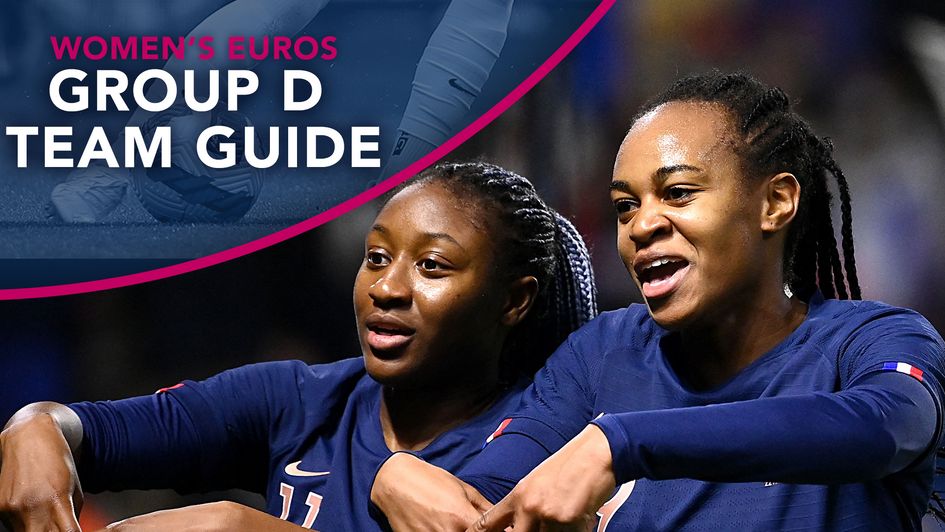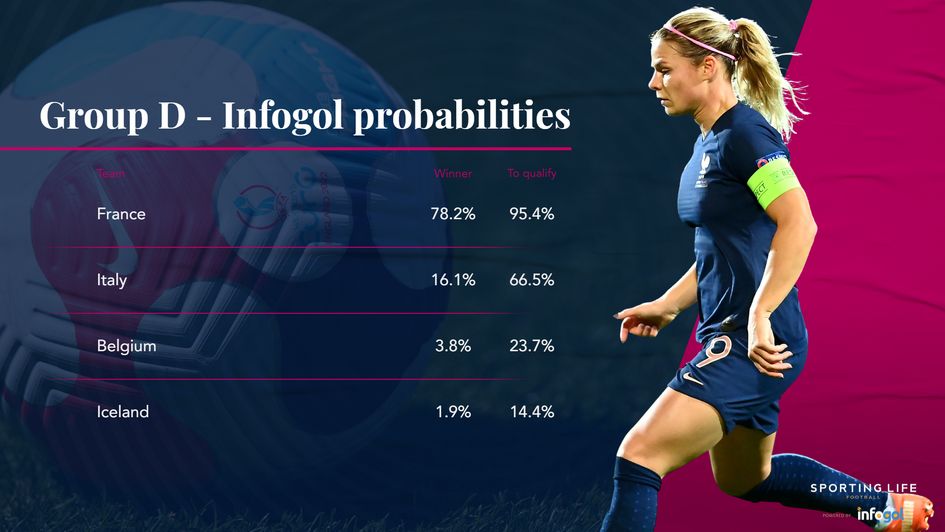France, Italy, Belgium and Iceland make up Group D in the Women's Euros, and Sophie Lawson takes you through the four teams in the group, highlighting points of interest.
France
- Coach: Corinne Diacre
- Key player: Marie-Antoinette Katoto
- Best Euros result: quarter-finals (2009, 2013, 2017)
- FIFA ranking: 3
It’s the summer and we’re heading into a major tournament, so that can only mean one thing: France are strongly fancied by many.
Historically, the reality has failed to align. The pedigree of the team and their growing experience counting for nothing as they’ve stumbled time and again, as their three successive quarter-final defeats at the Euros would suggest.
The caveat being that, this summer, for the first time in their history, Les Bleues have Marie-Antoinette Katoto in their ranks.
The Paris Saint-Germain front woman cast in a mould unlike any who have gone before her for France, her raw goalscoring ability the difference maker.
However, just like Spain, France rarely struggle in qualification, the team happy to fire in the goals when the pressure is off, but when they reach the big stages, the team folds faster than a seasoned pro having been dealt 2-7 off suit.
So, with Katoto in the side (and the striker likely to be flanked by PSG teammates Sandy Baltimore and Kadidiatou Diani) surely now it is actually France’s time, right? Well... In true French fashion – think the men’s team from 2010 – there has been plenty happening off the pitch to throw Les Bleues off course before they’ve even kicked a ball at this tournament.
The bottled history is that the French coach, Corinne Diacre has been butting heads with the team since she took charge and has too often made incompressible decisions, like leaving Katoto out of the World Cup squad three years ago or giving midfield maestro [and former captain] Amandine Henry the cold shoulder.
It is entirely possible that all of France’s failures at major tournaments and the friction ructions behind the scenes might inspire a deeper camaraderie in the squad, Lyon and PSG players finding common ground to ease any animosity. What I’m saying is, it could happen for France but that old saying about counting chickens.
Italy
- Coach: Milena Bertolini
- Key player: Cristiana Girelli
- Best Euros result: runners-up (1993, 1997)
- FIFA ranking: 14
I’m not saying Italy are the dark horses this summer, but Anna Sewell may very well have written a book about La Azzurre.
Just like other teams from around the continent, the growing professionalisation of the domestic game has helped Italy make up for lost time and regain some of the ground that had been lost.
One of the greatest nations to play the women’s game, Italy’s dominance came before the modern era, their trophies won away from the official gaze of UEFA or FIFA.
Yet, there is something about that generation that hangs around the Italy national team, something of that natural ability and swagger that has permeated through the consciousness of the current crop of players.
All but forgotten about at the 2019 World Cup, the nation that had been away from the FIFA tournament for so long that no players available for selection had even played at a Coppa del Mondo, La Azzurre navigated their way through to the last eight before being dispatched by the Dutch.
The team found a freedom with the limelight focused elsewhere, the tournament also their first outing under Milena Bertolini, the current coach who immediately got to work fixing the basic problems that had troubled the team under Antonio Cabrini (yes, that one).
At their best, Italy are a swashbuckling side that attack with ferocious gusto and can outplay even the most seasoned of challengers.
The problem being that Italy don’t always show up at their best but once again, being largely ignored in their group, all Bertolini’s team need do is drill into the best of themselves as well as the Italian tournament heritage, after all, it wasn’t so long ago that an Italian team were lifting a European title at Wembley.
Watch out for Juventus trio Cristiana Girelli, Barbara Bonansea and Valentina Cernoia.
Belgium
- Coach: Ives Serneels
- Key player: Tine De Caigny
- Best Euros result: group stage (2017)
- FIFA ranking: 19
Coached by the same man for over a decade, it is easy to argue that Belgium have stagnated under Ives Serneels, the 49-year-old seemingly at an impasse with the team, not knowing how to get the best out of his charges in tougher games.
Even with a strong crop of young players available to the manager, the team too often looks askew on the pitch; watching them being like sitting in front of a wonky picture that causes your eye to twitch.
Their inability to find the right rhythm with each other on display for all to regard when they clashed with England in a pre-tournament friendly, their best attacking pieces at odds with each other.
Like many other teams around them in the pecking order, Belgium don’t have a wealth of players to call upon, their talent pool one of the smaller to be represented at this summer’s Euros but it feels like an excuse to just say that’s why you shouldn’t expect much from the Red Flames.
The truth of it is that there is talent in that squad just as there are players for the future who’ll be in England, but as well we know, it doesn’t have to be about what you have but rather, how you use it. And it’s that utilisation that’s failing Belgium.
It will be a tough three group games for the Red Flames and, well, I think you know where I’m going with this.
Iceland
- Coach: Þorsteinn Halldórsson
- Key player: Sveindís Jane Jónsdóttir
- Best Euros result: quarter-finals (2013)
- FIFA ranking: 17
Am I allowed to pick two dark horses from the same group?
A nation that seemingly can’t be referred to without referencing the size of their population, Iceland are a team that few feel much animosity towards, rather they’re a perpetual favourite for the neutral.
But this summer, this team looks set to catch the attention of fans around the game, not for the size of their country but for the football they’re pedalling.
Having undergone an overhaul since the last Euros when a mixture of bad luck around injuries and poor officiating stopped Stelpurnar okkar before they had a chance to get going in the Netherlands, the team is the figurative phoenix this tournament.
Struggling for form under coach Jón Þór Hauksson (who took over from Freyr Alexandersson in 2018), Þorsteinn Halldórsson has turned the fortunes of the team around, installing confidence across the team, helping them harness their best football.
A stonewall at the back with Glódís Perla Viggósdóttir and Sif Atladóttir, the inspirational Sara Björk Gunnarsdóttir – who is only recently back from giving birth – anchors the midfield as a rotating stream of attackers and attack-minded midfielders can be rotated in, Iceland not a team to lean too heavily on any one player for goals.
But if you find yourself looking for one individual reason or just one individual as to why Iceland are not to be written off this summer, look no further than 21-year-old Sveindís Jane Jónsdóttir.
The Wolfsburg woman possesses an unrelenting hunger to get forward, cause fits of panic across defences and generally be at the heart of the positive play from her team.
With West Ham’s Dagný Brynjarsdóttir in a rich vein of form coming into the tournament as well as 20-year-old Karólína Lea Vilhjálmsdóttir settling into her role for Iceland, it’s hard to think this team won’t score, which is no small feat.
Are they about to win the Euros? Probably not, but that doesn’t mean they can’t cause an upset or two this July.













